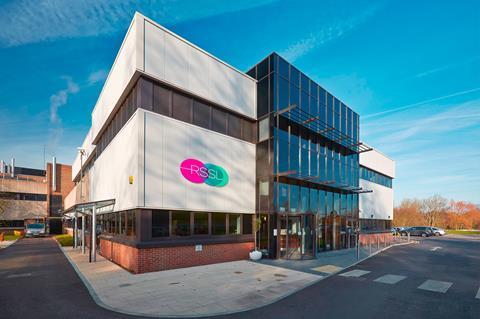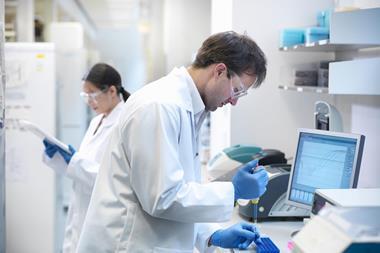Biotech startups and spinouts must overcome numerous challenges to get from lab to market. A new UK innovation hub aims to give this emerging sector the space, resources and expertise it needs.
Biotechnology companies have emerged as key drivers of pharmaceutical innovation, playing pivotal roles in the development of numerous groundbreaking technologies and therapies. These include modalities such as antibody-drug conjugates (ADCs), next-generation vaccines, and viral vector-based gene therapies. With their highly targeted modes of action and specificity, these advanced therapies hold great promise for many complex and difficult-to-treat conditions.1
One of the most high-profile biotech innovations over recent years has been the first approved mRNA vaccine, developed by German biotech company BioNTech, in partnership with Pfizer. In fact, in 2023, emerging biotech and biopharma companies originated 56% of all new drugs, including six first-in-class cell and gene therapies, as well as novel active substances in therapeutic areas ranging from neurology to oncology.2
The origins of innovation
Emerging biotech organisations come from a range of backgrounds. Some start as spinouts from academia, built on a foundation of promising research. Others emerge as start-ups from the venture capital ecosystem, bringing together researchers, drug developers, and experienced investors to accelerate the commercialisation of novel therapeutics.3
For both startups and spinouts, development can be a long and challenging process. During the early stages, these organisations are often breaking new ground in their research areas, developing entirely new products and processes all while utilising the latest state-of-the-art technologies. The transition to clinical and commercial production also brings further unique challenges, particularly when it comes to scaling up processes while maintaining long-term economic feasibility.
The complexity of drug development is compounded by the highly competitive nature of the pharmaceutical industry, which requires biotech companies to quickly advance their therapies and secure investment. To achieve success in this dynamic and challenging landscape, emerging UK biotech companies need to manage three core challenges: laboratory space, expertise, and adaptability.
lack of lab space was identified as a major limiting factor for the UK life science industry, with chemistry-based organisations among the hardest hit
Laboratory space
With a thriving network of small, innovative companies, based in universities and science hubs across the country, the UK is a powerhouse of scientific research. However, where countries like the US have succeeded in scaling many of their startups into fully fledged companies, the UK has hit a wall due to its limited availability of lab space.
In a 2023 report published by British Land and Savills, a lack of lab space was identified as a major limiting factor for the UK life science industry, with chemistry-based organisations among the hardest hit.4
These shortages are having direct consequences on the UK innovation environment, particularly for pharmaceutical and life sciences research. Without access to adequate facilities, emerging biotech companies can find themselves unable to effectively conduct the necessary research to drive their project forward. A lack of space can also hinder expansion efforts, restricting the amount of working space available, limiting production volumes, and reducing the number of staff members that can be employed.5
Even if a facility is appropriately sized, it may not be equipped with the necessary instrumentation. As emerging biotech companies are working at the cutting edge of their fields, they often require access to specialist equipment, which can represent considerable up-front investment if it needs to be sourced separately. Having access to the necessary instrumentation – either in the laboratory itself or in a nearby facility – can therefore be hugely beneficial for smaller companies.
Together, the combination of limited laboratory space and high equipment costs has the potential to significantly reduce the ability of biotech companies to innovate. To overcome this, it is becoming increasingly important for companies to be able to work with partners that can provide access to well-equipped facilities. In particular, laboratory space with added benefits such as flexible lease arrangements and technical support can play a major role in helping biotech companies drive progress.
it can be particularly difficult for biotech companies working on novel biologics […] to manufacture at larger volumes while maintaining batch-to-batch consistency, product quality, and economic feasibility
Expertise
Emerging companies can often struggle when transitioning from R&D towards larger-scale production and progression through clinical trials. This can be for several reasons, but a key factor is a lack of specific scale-up expertise.
Developers need to be able to manufacture their therapeutic at larger volumes while maintaining batch-to-batch consistency, product quality, and economic feasibility. This can be particularly difficult for biotech companies working on novel biologics, where products and processes are less standardised compared to more established modalities.
In the UK, these challenges have been exacerbated by talent shortages in the biotech space, particularly in leading-edge sectors like cell and gene therapy.6 This has made it difficult for companies to gain the required expertise during both the crucial early stages of development and the critical transition phases between R&D, clinical trials, and commercial production. Furthermore, the global regulatory landscape for advanced therapies is constantly evolving, and navigating this can be challenging – especially for smaller companies with limited in-house regulatory experience.
Sourcing expertise should be a key early consideration for biotech companies just starting out on their R&D journeys. By collaborating with external specialists who can provide dedicated expertise, companies can ensure that they are prepared for the future and the challenges that scale-up can bring.
Adaptability
Balancing scientific innovation with the commercial pressures of the pharmaceutical industry is a unique challenge. On the one hand, there is a need for emerging biotech companies to focus on building on their research to successfully commercialise their innovation. On the other, there are requirements to foster professional networks and secure financial investment. Dealing with these issues, often while facing limited internal bandwidth and tight timelines, means that, above all, emerging biotechnology companies need to be adaptable.

As such, a key consideration for emerging biotech companies is basing their company in a location that is conducive to easily accessing collaboration and networking opportunities, such as the ‘golden triangle’ in the UK. Located between Oxford, Cambridge, and London, the golden triangle is a region of scientific innovation and research excellence that comprises an extensive network of institutions and science hubs.7
When working with any external partners, biotech companies should also be focused on choosing the right collaborators to help drive their projects forward. With the ever-changing pharmaceutical landscape, biotech companies should partner with organisations that can be flexible and support their evolving needs. This should include being able to adapt their level of support to respond dynamically to changing timelines and differing production volumes.
Supporting biotech innovation in the UK
To support the UK biotech sector, RSSL, a cutting-edge pharmaceutical contract research organisation, has recently launched a dedicated platform to help de-risk and accelerate innovation.
RSSL’s Innovation Hub is a supportive ecosystem for early-stage biotech companies, providing a wide range of tailored services to help them progress from concept to commercialisation. These include on-site laboratory space with state-of-the-art equipment, the support of RSSL’s leading industry expertise, and access to an extensive network of industry contacts to support product development.
Strategically located on the University of Reading campus, the hub offers four different models that enable clients to collaborate with RSSL on a flexible basis depending on their needs:
- Innovate. Clients have access to laboratory space and equipment, with the option to utilise RSSL’s extensive range of services as required.
- Forge. Clients have access to laboratory space, equipment, and services, plus consultancy in key areas such as training and regulatory compliance.
- Launchpad. A model designed for clients looking for support with commercial development.
- 360. A model providing clients with full-service support across the entire development pipeline, from initial concept to commercial manufacturing.
For more information about the Innovation Hub, please contact RSSL.
References
1. HX Nigh et al, Med. Chem. Comm., 2018, 9, 757 (DOI: 10.1039/c8md90019a)
2. IQVIA Institute, Global trends in R&D: 2024 activity, productivity, and enablers. https://www.iqvia.com/-/media/iqvia/pdfs/institute-reports/global-trends-in-r-and-d-2024-activity-productivity-and-enablers/iqvia-institute-randd-trends-2024-02-24-forweb.pdf. (Accessed July 2024).
3. Biotech startups struggle with founder-led ventures, techbio funding. Biopharma Dive. https://www.biopharmadive.com/news/biotech-startups-founder-led-venture-funding-techbio/642223/. (Accessed July 2024).
4. British Land, Accelerating innovation: Report November 2023. https://www.britishland.com/sites/british-land-corp/files/2023-11/Accelerating-Innovation-Report-Nov-2023.pdf. (Accessed July 2024).
5. UK firms face critical lab space shortage. Chemistry World. https://www.chemistryworld.com/news/uk-firms-face-critical-lab-space-shortage/4016403.article. (Accessed July 2024).
6. Where has all the talent gone? Genetic Engineering & Biotechnology News. https://www.genengnews.com/industry-news/where-has-all-the-talent-gone/. (accessed July 2024).
7. The rise of the ‘scale-up’: Why Europe needs to foster more start-ups. Labiotech.eu. https://www.labiotech.eu/in-depth/scale-space-white-city/. (Accessed July 2024).

















No comments yet